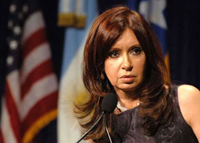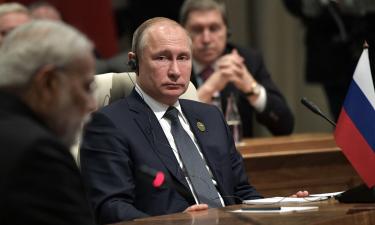Two women fight for presidency in Argentina
As in most South American countries, with the sole exception of stable Chile, there is little certainty about the future of Argentina’s politics. However, in the current scenario it is easy to forecast that the next president of Argentina will be a woman.

Senator Cristina Fernandez de Kirchner will seek to succeed her husband, President Nestor Kirchner, as head of South America's second-largest economy in the October presidential election. To do it, she will have to defeat the tough leader of the opposition, who is also a woman, the former lawmaker Elisa Carrio.
Cristina Kirchner, 54, has represented the province of Buenos Aires in Argentina's senate since 2005. Prior to that, she was a senator from the Patagonian province of Santa Cruz, where her husband served as governor for 12 years before assuming the presidency in May 2003.
According to opinion polls published by main local newspapers, Cristina, as she likes to be called, leads with 46% followed by Elisa Carrio, with 14%. If Cristina manages to confirm this figures in October vote, she will win in the first round, as according to the country’s constitution, a candidate must win 45 percent of the vote outright or 40 percent with a ten percentage point lead over the next candidate to secure a first-round victory.
However, the task does not look so easy. As Public approval for President Kirchner is sliding as an energy crisis forces companies to cut back on production and lay off workers. His approval rating fell to 52 percent in June from 57 percent in May, the lowest level since he took office, Buenos Aires-based polling company Poliarquia reported last week. The president's approval peaked at 82 percent in February 2004.
Interrogations about Cristina candidature came as according to all surveys, his husband Nestor Kirchner, has better approval ratings than her. He is also better positioned in all researches, collecting up to 52% of the preferences, and is legally authorized for a second term in office.
However, the recent sliding of Kirchner’s approval rating confirmed his wife as the candidate. Also, Kirchner’s candidates lost two key elections last Sunday. In Buenos Aires, Kirchner’s Minister of Education lost Major’s elections to right-wing businessman Mauricio Macri. And in Argentina’s far South, in the province of Tierra del Fuego, his candidate Hugo Coccaro, lost to leftist Fabiana Rios, a close collaborator of his most feared opposition leader Elisa Carrio.
Followers of Elisa Carrio are happy with the decision of Kirchner to step down and fuel the candidacy of his wife. “The election will be polarized between two women”, they say. Other candidates who could face Cristina in a second round are Kirchner’s former Minister of Economy, Roberto Lavagna, and the right-wing economist, Ricardo Lopez Murphy.
``Without a doubt, Cristina will win the first round,'' Interior Minister Anibal Fernandez, who isn't related to the senator, said in an interview with television channel Cronica TV. On Monday, posters with Cristina’s face covered the walls of Buenos Aires with the slogan: “The change has just begun”.
As per the first moves, the government will try to promote Cristina as a change in continuity. The first lady has recently toured Latin American and European countries to promote her image among Argentineans.
Cristina Fernandez has a long record in Argentina’s politics. She became a prominent lawmaker in the nineties after aiding his husband –at that time Governor of the oil-rich Province of Santa Cruz- to broker the privatization of the State run oil monopoly. She is said to be obsessed with her fitness and health, as well as her public image. She drinks mineral water from just one brand and often wears designer labels.
On the contrary, Elisa Carrio, a 50 year old lawyer born in the northern province of Chaco, opposed to the privatization of the national oil company and led an investigative congressional commission against money laundering. Cristina was a member of the commission led by Carrio. Sources say she was concerned about the results of the investigation, as her husband had saved provincial public funds abroad, through banks and financial operators quoted in the conclusions of the report.
Hernan Etchaleco
Subscribe to Pravda.Ru Telegram channel, Facebook, RSS!




